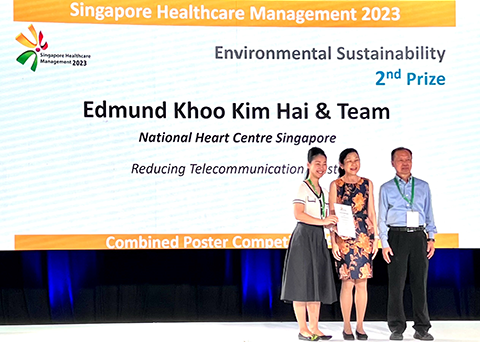In an era where environmental responsibility is paramount, various departments in the National Heart Centre Singapore (NHCS) has been taking proactive steps towards environmental sustainability. As part of this endeavour, a project led by Support Services colleagues kickstarted with an important mission: to assess and minimise electricity consumption at NHCS.
Mr Edmund Khoo, Senior Associate Executive from Support Services, conveyed, "We actively participated in numerous group discussions and collaborative brainstorming sessions with colleagues from the Process Transformation and Improvement department, where they shared valuable ideas to drive forward this environmental sustainability project."
The primary issue identified was standby power consumption, where electrical appliances draw power even when turned off or in standby mode. This hidden culprit accounts for a significant portion of electricity usage, owing to various factors such as maintaining signal reception capability, powering internal clocks, continuous display functions and battery charging. To tackle this, the team set out to remove underutilised telecommunication equipment.
Hunting Unused Devices
“During our site review, we encountered challenges in locating specific telecommunication lines. This led us to remove cabinets and various obstacles in order to uncover concealed and unused telecommunication infrastructure,” Edmund further explained.
Edmund (above) conducting a phone line functionality test
The team's site review revealed several underutilised fax machines, Visa and NETS terminals, with the use of these older technologies declining as more people opt for email and online payment methods.
To validate their findings, the team further conducted an in-depth examination of telecom bills spanning from January 2022 to February 2023, to assess the usage levels of the direct lines connected to these devices. They discovered that certain payment terminals had minimal activities, with either zero or just one transaction, and there were various fax lines which showed no usage.
Edmund added, “We identified each low-usage telecommunication lines and traced them to their respective locations. Subsequently, we consulted the Heads of Departments responsible for these devices to determine the need for the telecommunication lines associated to the devices.”
Clearing the Clutter
After the final review, 26 Visa and NETS terminals exhibited inactivity or extremely low usage over a one-year period, and 50 fax lines were found to be under-utilised or inactive. 20 standalone fax machines were also decomissioned due to their age and their low utilisation rate.
The underutilised Visa and NETS terminals were returned to its vendor, for refurbishment and new use by other companies, thus optimising resources and reducing the need for new terminals. Additionally, the condemned fax machines were sent for e-waste recycling, while the remaining fax machines remained as printers, given their multipurpose copier-printer units capabilities.
Eco-positive Results
The project resulted in savings of 2023 kilowatt-hour (kWh), equivalent to power for 7.3 households over a 30-days period. It also translated to a whopping total savings of $30,880 per annum from the termination of subscription for the telecom lines linked to the Visa/NETS terminals and fax lines and the annual rental cost for each physical Visa and NETS.
The initiative yielded numerous intangible benefits, including decluttered workspaces, elimination of old and unused devices, and the creation of cleaner and tidier environments conducive to enhance infection control. Furthermore, it resulted in substantial cost savings on equipment maintenance and fostered a positive environmental sustainability mindset among colleagues, by seamlessly integrating eco-friendly practices into daily operations.
The project even achieved second place in the ‘Environmental Sustainability’ category at the Singapore Healthcare Management 2023 awards.
Project members Edmund (left) and Ms Wendy Chu (right; Senior Executive, Operations from Support Services) with their award-winning poster. Members not in picture: Ms Jacqueline Huo, Ms Goh Li Woon
Future Green Horizons
While individual acts of environmental sustainability may appear modest in isolation, their cumulative impact can be remarkably significant, resulting in substantial energy and cost savings. Looking ahead, the team hopes to explore other electronic devices which can contribute to reducing electricity consumption and cost savings, as part of NHCS’ journey towards environmental sustainability.















